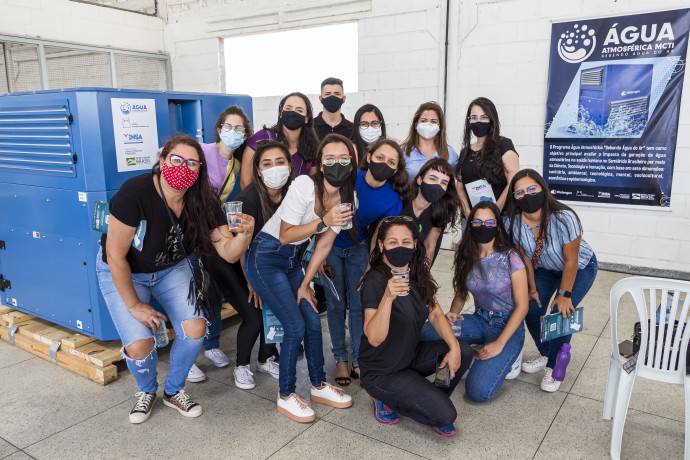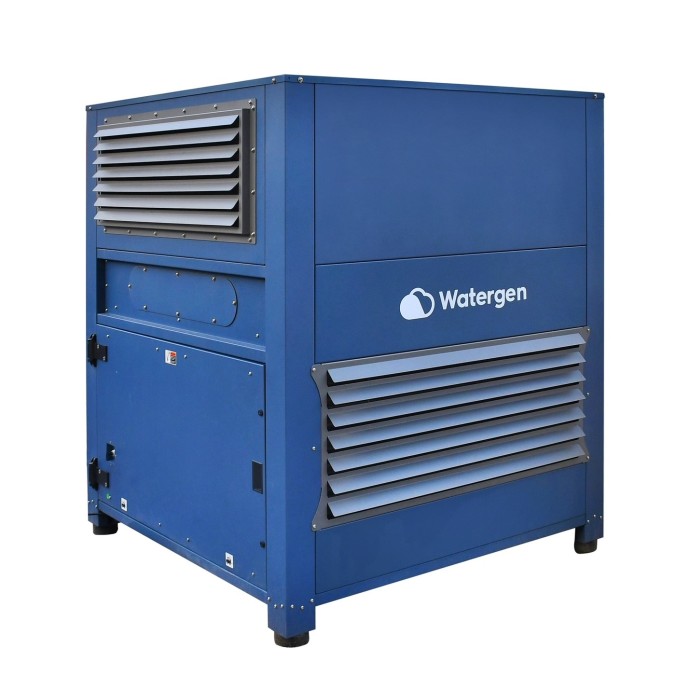‘Our goal is to make the world cleaner, safer and healthier in a significant way,” says Michael Mirilashvili, owner of Watergen, the Israeli company which owns a unique patent that enables it to produce quality drinking water from the air for domestic and commercial needs.
The World Health Organization estimates that 80% of diseases worldwide originate from contaminated water. For example, groundwater in a third of India’s 600 provinces is considered undrinkable, with dangerous levels of fluoride, iron, salinity and arsenic.
The water shortage, the problem of pollution and the way this precious resource is transported have also become an ecological problem that negatively affects the health of the planet. The solution offered by Watergen – the possibility of producing clean, mineral-rich water from the air – addresses the sustainability problem that is currently plaguing many companies and countries.
“Large organizations and governments frequently speak about global warming,” Mirilashvili says. “They set goals for themselves, such as lowering the carbon footprint by 2050, or look ten years ahead, so that no one can blame them – because by then, the leadership of those organizations has changed. It is irresponsible.
“What’s important for us is to move quickly now, not to build plans for 20 years from now, because we can make the change today,” he explains. “Even when you look at public companies, which give a social commitment to meet environmental goals in the next decade, you see that they don’t meet their own projections.

“We want to create a world where there are machines that produce water directly for the consumer, whether it is for private or commercial usage. This way, there is no dependence on plastic bottles, and we can end the transportation of water in vehicles, ships and planes – something that also causes pollution.”
Founded in 2009, Watergen has become a world leader in the atmospheric drinking water generation (AWG) market for machines that create drinking water from the air. The company’s solutions enable a cost-effective response to the global shortage of drinking water and enable the disappearance of supply chains that are harmful to the environment.
The importance of water to the issue of sustainability is even broader. Water shortages cause drought, hunger and political instability. In addition, beyond the fact that the agriculture industry requires a continuous supply, water is also needed for many industries such as textiles, microchips, automotive and more. Unlike other methods, such as desalination, Watergen’s technology does not use existing water reservoirs, but adds a new water resource to the world. It is not by coincidence that the company meets 13 of the 17 sustainability development goals established by the United Nations.
“We don’t need water only for drinking. It’s used in almost every industry of our lives, for agriculture, heavy industry, textiles, even for server farms,” says Mirilashvili. “We need water everywhere. Especially now that the world is talking about switching to green energy and the use of hydrogen, they need water for that as well. Water is the basis of everything, and we can provide water to all industries – not just for drinking water. We believe that in just a few years, we will impact the global environment.”
A singular heat exchanger+
In the beginning, the company focused on its uncommon invention – a heat exchanger made of a special polymer, which made it more efficient for use in products such as air dryers or tumble dryers. After Mirilashvili acquired the company in 2016, it began to focus on the new vision. Mirilashvili purchased the company to focus it on creating mineral-rich atmospheric water, which initially drew resistance from the original team. “Not only did the developers not understand the direction, but also many other business people who came before I had invested said that it did not impress them,” the entrepreneur recalls.

“When I realized the level of efficiency of the heat changer, it really impressed me – and when I asked if it was possible to take it in the direction of water, they immediately answered that it was possible,” he says.,
“For me, water is the source of life. Water is like the Torah for the people of Israel. Water is the most important thing for humanity, and it directly concerns our food security. When I realized its importance, I believed that I could become involved with the company and convince them about the journey. The developers said it was true and amazing, but that it was just a dream. They had deals in hand, offers from big companies that wanted the heat exchanging technology, and they wanted to make an exit.”
Mirilashvili first entered the company as an investor, and when he realized that his vision and that of the entrepreneurs were at odds, he asked them what amount of money they expected for an exit and paid them more than they had requested. In 2016, the company established the most advanced water research laboratory in the Middle East, opened collaborations with universities and research institutions, and began developing its products.
Today it operates in three main verticals with smart and easy-to-install products: The first comprises devices for home or office use, which offer an alternative water source. The second vertical is commercial – devices with a substantial capacity, designed for residential buildings, hospitals, universities and more.
The company's products include the GENNY Home, with a volume of up to 18 liters of water per day; the GENNY, which produces up to 30 liters per day; the GEN-M1, which produces up to 220 liters; the GEN-M Pro, which produces up to 1,000 liters (one cubic meter) per day; and the GEN-L, which produces up to 6,000 liters (six m²) per day. In addition, the company manufactures the Mobile Box, a mobile device that provides up to 20 liters of water a day.
“The decision to acquire the company and convert it into the production of atmospheric water for drinking was 100% of my vision – that of the sanctification of God’s name and the glory of the State of Israel; the business issue was secondary,” Mirilashvili notes. “Even today, my top priority is to provide water to the world and make sure that everyone has access to this wonderful resource.
“At the same time, the business results have pleasantly surprised us, he said. “Of course, we are interested in the business aspect, but this is so that we can take these measures to realize our vision in the fastest way possible. When I began my involvement in the company, I told the employees that time equals human life. As time passes, more and more people suffer or die from a lack of water or from contaminated water. We are already seeing that the goal is achievable. It is no longer a question of ‘if’– it is only a matter of how quickly we can reach the rest of the world.”
Global recognition
The company’s groundbreaking technology has received a great deal of global recognition. Twice, it has received the Innovation Award at the prestigious CES exhibition in Las Vegas, has been featured in Time magazine’s list of 100 important inventions (in 2019’s “Social Good” category), and is one of the eight most essential inventions in the State of Israel, according to the rankings of the Chamber of Commerce and Industry, alongside major inventions such as the Iron Dome and Mobileye.
Today, the company operates in more than 85 countries around the world, including the United Arab Emirates, and it even supplies mineral-rich drinking water to the Gaza Strip. This is in addition to research collaborations with academic institutions such as Ben Gurion and Tel Aviv universities and the Institute for Water Research, which opened in Abu Dhabi.
Besides its business activities, the company also works on behalf of humanitarian purposes worldwide, such as providing pure, mineral-rich water produced from the air to areas controlled by freedom fighters in Syria, and even aiding war-torn Ukraine. One of the advantages of the company’s devices is that they can be operated using electricity produced by solar energy. The company has several factories around the world: in the UAE, India, Israel and two in the United States.
“We are investing a great deal of research funding to bring about the next generation of technology – a product that will work on renewable energy only and can produce water anywhere,” says Michael Rutman, co-CEO of the company. “In the coming years, we will increase energy efficiency tenfold and penetrate heavy industries such as agriculture and renewable energy.”
Recently, the company presented its developments at the EcoMotion conference held in Tel Aviv, where it showed its importance to the transportation industry, whether it be producing water inside the car for the benefit of the driver or, of course, supplying water for the engine. The company also offers water production facilities that can be mounted on the backs of motor homes or other large vehicles.
“Whether it’s the autonomous vehicle industry, yachts, cargo ships, planes, the textile industry or a server farm – and almost everything you imagine – the demand for water is tremendous,” Rutman explains, “It’s not [just] innovation: It’s a matter of sustainability. Even beverage companies like Coca-Cola need huge amounts of water to produce the drinks. It’s unimaginable.”
Translated by Alan Rosenbaum.
This article was written in cooperation with Watergen.
